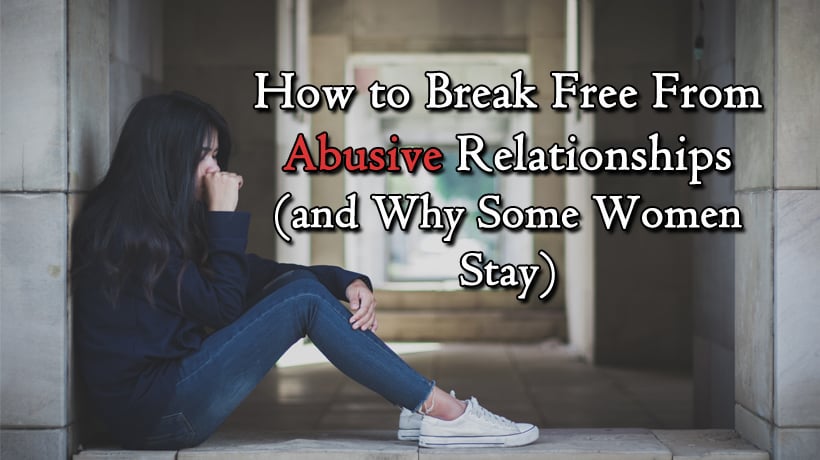You have the instinct that this situation is unhealthy for you, and your friends and family members have told you to ‘leave.’ But you just feel like you can’t – at least not yet. It may be more complicated than you think based on relationships from your past.
So why do you stay?
‘Abusive’ may not be so easy to recognize
People can hide their abusive nature by also having positive traits. Some might be successful or upstanding citizens in the community (like a leader, priest, or teacher). Sometimes they are generous, helpful or vulnerable, which endeared you to them and makes you want to be close to or take care of them. This behavior pattern – being ‘nice sometimes’ and ‘controlling, mean or inappropriate’ at other times – is called ‘Crazy-Making.’ Why? You keep flip-flopping whether you think they are ‘nice’ or ‘controlling’ and it makes you feel like you can’t figure them out. It’s also called ‘Crazy-Making’ because the abusive person highlights all the ways they are ‘good to you’ and denies the ways they control you. Even though you know inside something doesn’t feel right, you feel bad saying negative things about them. There is no external validation to ‘know what you know.’
You think ‘it’s all on you’
Abusive people usually explain situations by blaming you or external conditions, suggesting that you are ‘not enough.’ They never point to the effect of their own behavior. And if you have a history of people blaming you for their limitations, it might seem familiar to ‘buy into’ this view. It’s possible that you have done things you regret in an effort to try to get that person to change. Thinking it’s ‘your fault’ keeps you involved to try and make things better.
You have hope it will change
After some time, you might start seeing their hurtful behavior as abusive. You’ll feel empowered to create distance or to refrain from giving them attention. The abusive person will sense this distance and apologize or indicate that they will not continue their behavior. Seeming genuine, you might be tempted to believe them. However, someone who is capable of being abusive is someone who is split between their ‘good side’ and ‘bad side’ – by definition they are not well self-managed. Remember that they are not capable of keeping their promises.
You need the money
You might need the money you get from that person to support yourself – but only for the short term. YOU are the one who is capable of being the source of your income. Today can be the first day you plan out how to make money for your talents in another situation to avoid being dependent on them.
Feeling like a victim is familiar
You may have grown up with role models who were also controlled by someone, and/or with an important person who controlled you. With this history, the picture you develop is that relationships always involve a ‘controller’ and the ‘controlled.’ That feels familiar to recreate. There might be people in your current life who give you sympathy for being in such a hard situation – a way of getting positive attention that you’re not receiving n your adult life. You deserve attention for being someone who is talented and loving; that’s the kind of attention you deserve and want to seek out.
You’re letting others determine your worth
As a child or young adult, it’s normal and adaptive to look to parents, teachers, peers and bosses to grow self-esteem and evaluate our abilities. This is how we get our ‘emotional oxygen’ (e.g., love, praise, attention) growing up. As we develop, we shift to get that self-regard from within.
You might still be involving others in order to get a feeling you are worthy (seeking other’s approval, preventing their criticism and rejection or pressuring yourself to be perfect). These behaviors make you focus on how others are treating you and keep your attention away from taking a stand for YOUR life. In this scenario, you care too much about what they think of you. As you can source confidence from within you’ll have the courage to say, “I don’t need you in order to feel powerful in myself. In fact being around you is keeping me from living MY life’s purpose.”
You are afraid of being alone
There might be reasons for why it’s so hard to leave – you may feel a sense of loss in giving up the good times. Or the opposite, you might be concerned you will face violence (if so, you should seek legal help and get an order of protection) or the person might pester you emotionally as you start to remove yourself from their life. Finally, if things are calm and you don’t have to constantly react or resent the other person all the time, it might even feel boring or lonely. Yet when you firmly make a decision and have faith that you can have all the things you want once you are on your own, it will help you stay strong in your boundaries.
Sometimes the reasons you may be staying are riddled with behaviors from the past and are more difficult to break through. There are many support groups and therapists who can work with you to create change.



